All Forum Posts by: Brett P Swarts
Brett P Swarts has started 214 posts and replied 252 times.
 Post: Difference Between 1031 Exchange and The Deferred Sales Trust
Post: Difference Between 1031 Exchange and The Deferred Sales Trust
- Specialist
- SAINT AUGUSTINE
- Posts 261
- Votes 26
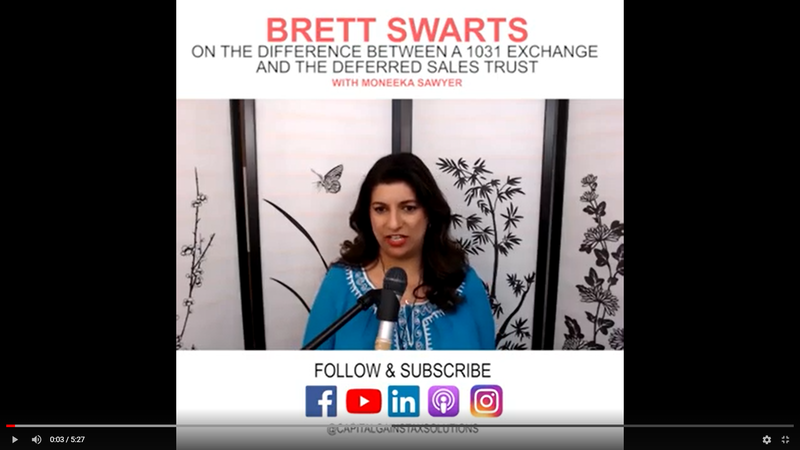
Moneeka Sawyer:
Why don't you tell us the difference between a 1031 exchange and the DST, which is what you use, right?
Brett Swarts:
Sure, yes. So the premise is this, most business owners or commercial real estate owners, or high-end primary homeowners, they struggle with capital gains tax, somewhere between 30 and 50% of their gain when they go to sell their highly appreciated assets. So we use a deferred sales trust to replace the 1031 exchange to give liquidity, diversification, flexibility, and then the ability to go back into real estate at optimal timing. That's really the premise here. So that high net worth individuals can create and preserve more wealth. And optimal timing is the key here. Because, most of us know when it's a seller's market for real estate, and when it's a buyers market, most would agree today, especially here in California, and even most states that prices are through the roof, they're ultra-high. It's hard to make sense of any deals right now, with cap rates being so low, right, interest rates being so low, and rents haven't appreciated such a great deal over the last number of years. So you couple that wit, I'm going to sell high, that's great. But our parents taught us to sell high and buy low, not sell high and buy higher, which is not optimal. So the 1031 exchange, the first thing is, you sell a piece of property, you need to buy something of equal or greater value, you can do identify potential properties within 45 days, and then close within 180 days. And so we call that the sell high, buy higher 180 days later, which is not what you want to do. So that's the first thing, is timing. Do you want to buy an optimal time? I mean, do you want to sell high and buy low? And that's the intention, how can I sell high now sit on the sidelines, be debt-free, and really kind of park until I see a deal?
Well, so the intent is to have timing, the challenge is the 1031 doesn't allow you to have that timing, the solution is the Deferred Sales Trust and that we can literally sell high now sit on the sidelines, all tax-deferred out of debt, and you can wait for a deal. And that could be tomorrow, that could be day 181. That could be five years from now. But the key is, what is it best timing for you when you find a deal. And I'll tell you about a quick deal story. We had a gentleman who did this in 2006. AHe's one of the top Deferred Sales Trust clients he sold. We call this the Monday morning quarterback, he dropped back and he threw the perfect pass at the perfect time sold at the peak moved all of his funds to the deferred sales trust. And this is a large, large transaction. And he was able to defer all the tax five years later, that same property that he sold was foreclosed on by the buyer who by the bank, who found the buyer, the buyer was foreclosed on by the bank. And he bought that property back through his trust all tax-deferred not using a 1031 at 60 cents on the dollar. We call that buying at an optimal timing, right? Sold high bought low. And so that's the first thing about the 1031 exchange, it doesn't allow you to do that.
The second thing about the 1031 exchange is it forces you to buy equal or greater value, which often means equal or greater debt. So let's say you sold a $10 million property, and you had $4 million in debt. Well, now you need to buy equal or greater value 10 million or more, which most folks end up buying more. Now you're not only taking on that 4 million in debt, you're taking on five or $6 million of debt. And again, you couple that with not buying it optimal time and you're putting yourself in a risky position. Also, we call that dumb debt, taking on too much debt for a property that doesn't make sense, just because you want to defer the tax. And that's where most people live in the commercial real estate world. They just buy and sell via 1031 exchanges and overpay or they get it, they get a bit smart and they buy and then they sell and pay the tax. But we would say no, there's a better solution. It's the third one, it's called the Deferred Sales Trust, put it into the trust get the best of both worlds. The next thing to consider is what's called the Depreciation Schedules for any of your listeners who are listening, and I've owned for a long time, especially 27 and a half years if you have multifamily or 39 years of its commercial, eventually you go to zero depreciation and appreciation is the number one reason or the top two reasons to own commercial real estate and my book because it offsets the income that's coming in. The only thing that does this is business or commercial real estate, therefore you pay less than taxes. However, if you own long enough, you eventually depreciate out if you've done multiple 1031 exchanges, you also depreciate out the depreciation is handled travels with a 1031 exchange, which is not good, right? You want more depreciation, you don't want the same schedule.
So the intent is to get more depreciation. The problem is the 1031 exchange, it travels so it doesn't give you more unless you buy a bigger, bigger property. The solution is a deferred sales trust, you can sell the funds into the deferred sales trust, and then use those funds kind of like a self-directed IRA, to go purchase new real estate via a new LLC where you're the managing member of and you're running that deal the same way you would be except now you get a brand new depreciation schedule, which is really powerful for creating and preserving more wealth.
Learn more about Deferred Sales Trust
Visit: www.capitalgainstaxsolutions.com
 Post: HOW BRETT GET INTO REAL ESTATE, AND CAPITAL GAIN TAX SOLUTIONS
Post: HOW BRETT GET INTO REAL ESTATE, AND CAPITAL GAIN TAX SOLUTIONS
- Specialist
- SAINT AUGUSTINE
- Posts 261
- Votes 26
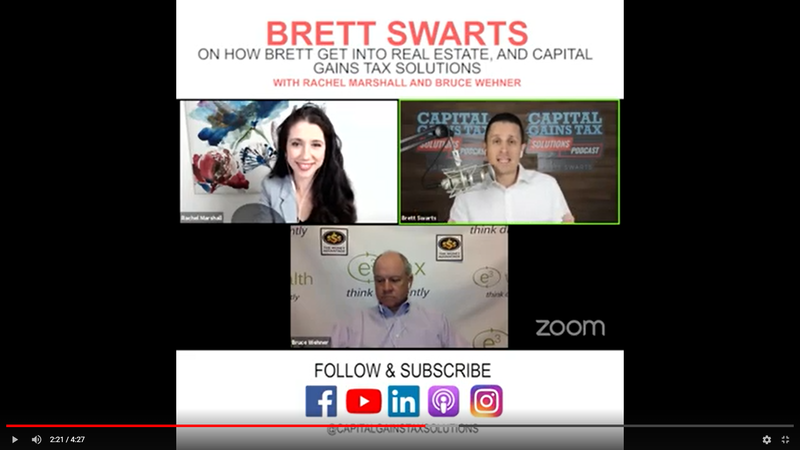
Rachel Marshall:
Brett, let's go ahead and start back from the beginning. Tell us how did you get into this space specifically with real estate, capital gains, and taxes? How did that all come to be for you?
Brett Swarts:
Yes, great question. Thanks for having me on the show. So most high net worth individuals who own commercial real estate, they struggle with capital gains tax. It started in 2005 - 2006, at Marcus and Millichap, when people buy and sell an investment or real estate, as I learned the brokerage side of things. That was during the time when the market was very, very, let's say, seller's market prices were high, people were making a lot of money. They were doing a lot of 1031 exchanges. As a part of that 1031 exchange, they love to be the seller, but they load being the buyer. Right? They felt like they were overpaying, taking on too much debt equal or greater value chasing deals, we call that the shotgun 1031 wedding. Getting engaged in 45 days, and you're getting married and 180. Then the music stops, right, and it stops in an abrupt place.
Now in 2008, we saw a lot of friends, family, and clients lose half or some of them lost everything. At the time, too, I was kind of just new to the brokerage business. I was just trying to make it myself. I don't know if you've ever been in this position where you're working so hard at something and you're so in love with what you're doing. But you're not having a lot of traction financially, that's where I was I was newly married, had my first daughter at home, and during this period where I started to get some success and then it hit that brick wall 2008 but it wasn't just my own brick wall and my wife and my family's financial brick wall. But it was also the brick wall for a lot of these clients who had worked, you know, blood, sweat, and tears for 10 to 30 years.
I have these properties, own these properties through multiple exchanges, only to find that they weren't diversified. They weren't liquid, there's I think the banks had overpaid for properties and see most of them knew they were overpaying at the time in the sense that they thought it was a seller's market, but they felt they had no choice, they felt they were trapped by the capital gains tax. So I did what every good entrepreneur does, and you try to figure out a way to help your clients and had to face that ever again. But also how to keep the finances coming in. So I guess side job, side hustle at a place called Cheesecake Factory, my wife’s favorite restaurant. So by day, I will be baking calls trying to help you negotiate with things or my clients and or with the city and county for taxes. By night I've been trying to serve cheesecake and keep the lights on in my house. So that was a really trying time. So the Manager at Cheesecake Factory said “Hey, look, you have two degrees in the minor your success, you're trying to be successful in real estate looks like you had some success. But now you're in a tough spot. I want you here for two years. As long as you stay for two years, I will hire you.” So I give him that commitment. And for sure for two years in one day. By day I was trying to figure out how to make it work. And so I learned about the deferred sales trust with my manager, actually, at the time in Sacramento, brought in a gentleman to speak and he's now my business partner you name is Robert. And he's kind of the co-founder of the deferred sales trust. He's a financial advisor in this role. And he went on to tell us about how the deferred sales trust could solve those limitations. The 1031 exchange often forces people to overpay. So fast forward, I learned about it, and I expect to apply it to my business. And as I started to apply it and I rolled it out to my clients, I can see my business grow because I started to add value beyond just what a lot of other brokers were just talking about, which was just the 1031 exchange. That's where we have five kids live here in Roseville, California Sacramento still and we've been able to keep my wife from full-time. That's her love and her passion, to raise our five kids, and life has never been the same. Now I coach and train and teach Financial Advisors, Business Brokers, Commercial Real Estate Agents, and syndicators as well as luxury real estate on how to help their clients escaped the capital gains tax 1031 race as well.
Learn more about Deferred Sales Trust
Visit: www.capitalgainstaxsolutions.com
 Post: Dan Handford On Biggest Frustration with Capital Gains Tax
Post: Dan Handford On Biggest Frustration with Capital Gains Tax
- Specialist
- SAINT AUGUSTINE
- Posts 261
- Votes 26
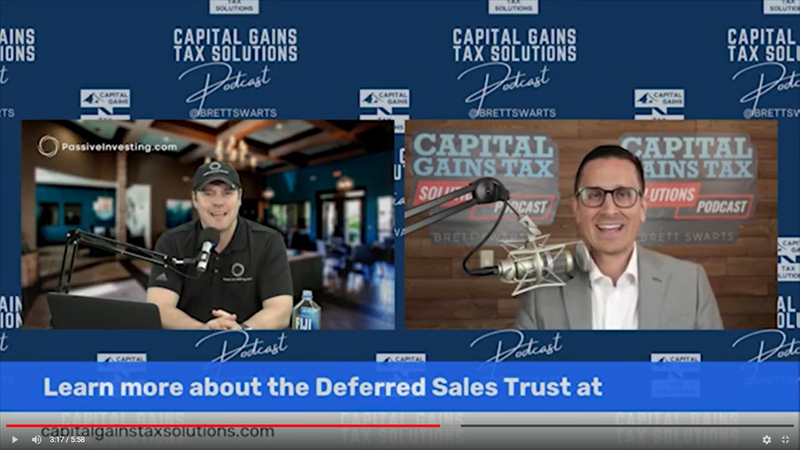
Brett Swarts:
Welcome to the capital gains tax solutions podcast. This is an intro to our full podcast with Dan Handford. He is the founder of Multifamily investor nation and PassiveInvesting.com, Value add multifamily, mostly in North Carolina and South Carolina. And we're gonna have a full interview. But I have Dan here for just one question. And this is the question, Dan, what's the biggest frustration when it comes to capital gains tax referral for high net worth clients or partners or friends or family? For other assets, site types besides investment, real estate?
Dan Handford:
Well, like we said, on the podcast that we just did, it's one of those things where when you have a taxable event, whether you're selling a business, or you're selling some high-value stocks, whether it be cryptocurrency or something else, or you're selling real estate, and you have this big capital kind of tax gain event, then the biggest frustration is trying to figure out how can I keep as much that money in my pocket as possible for as long as possible. And so being able to have the ability to, you know, defer those taxes into a deferred sales trust, and things like that are really beneficial for you, as you're trying to walk those different steps and be able to figure out, how can you keep more money in your pocket as long as possible?
Brett Swarts:
Yeah, 100%, you know, the biggest thing we found is taking something that's let's say, illiquid and or not producing cash flow, right, such as like a cryptocurrency or such as a highly appreciated business that's maybe producing, you know, $500,000 of income, but you could sell it for maybe $15, you know, $15 million or $20 million, and someone else can come in and double that you capture all that value, or even a primary home when you get a deal in Palo Alto, but $8.3 million, these are a lot of times either non-cash flowing, producing properties or assets, or low return on equity assets. And so when you can capture that value, and take that either he called lazy money or dead money, right debt-equity, and then move it into value, add multifamily properties or other assets that are going to help you grow your wealth. That gives you more wealth, more freedom, more options, more diversification, by the way, more about that at www.capitalgainstaxsolutions.com. Any last thoughts on that, Dan?
Dan Handford:
Yeah, I was just gonna say I don't know any business that's only generating $500,000 in revenue, you're going to sell for $15 million. That's a pretty nice equity multiple, but I do understand the concept of trying to go to take that $500,000 and exit, maybe it's a 5-7x multiple, depending on the business, but definitely be able to kind of tap into that kind of debt-equity and put it into work for you. But to increase that cash flow.
Brett Swarts:
100% Yeah, that's probably not a good number for me on the 15 minutes for like a three and a half. You know, I'm trying to think I'm doing a deal right now. Actually, it's interesting. It's a just listen to property like today, it's a multifamily property, they have no basis, it's about a $2.6 million sale, they bought it for about $1.2. And, you know, they've run out of that depreciation and their cash one about $120,000 NOI per year. And so we did the simple math, we said, okay, 120, on about 2.6 gives you a return on equity, I think about 3%. And I'm saying if we capture that value, you know, put in the deferred sales trust, which is, which is the plan, and then go redeploy that we can probably increase your cash flow to about $50,000 to $60,000 per year, like immediately. And they're like, that makes sense. And we can get a new depreciation schedule if we do it active. So lots of ways to carve that out. The key is to get clarity on that, go to www.capitalgainstaxsolutions.com. Learn more about that. And for Dan, for those who want to get in touch with you learn more about multifamily investor nation and or investing. As an accredited investor, what's the best place for him to find you?
Dan Handford:
Sure, you can go to www.passiveinvesting.com and fill out the questionnaire there about joining our Passive Investor Club. And then one of our Investor Relations team will reach out to you to discuss your investment goals and see if you're the right fit for our group. And then if you want to join us on the Multifamily Investor Nation, you can go to www.multifamilyinvestornation.com, or go to www.mfinsummit.com to check out our event that we do twice a year. And if you want to just connect with me, you can go to linkwithdan.com that'll take you directly to my LinkedIn profile. You can connect with me there and follow some of the content that we're posting every regular, weekly, or monthly content.
Brett Swarts:
Beautiful. Thanks, Dan, and look for the full interview to drop section on YouTube right now. But it's gonna be on iTunes and we're talking about Dan's story. We're talking about deals talking about COVID-19 talking about collections, talking about the future of the real estate and investing. Also, you can create and preserve more wealth or help your clients do the same. Hey, appreciate you watching this short video. Thanks so much. Take care.
Learn more about Deferred Sales Trust
Visit: www.capitalgainstaxsolutions.com
 Post: DIFFERENT DECISIONS TO GET TO THIS POINT IN HIS JOURNEY
Post: DIFFERENT DECISIONS TO GET TO THIS POINT IN HIS JOURNEY
- Specialist
- SAINT AUGUSTINE
- Posts 261
- Votes 26
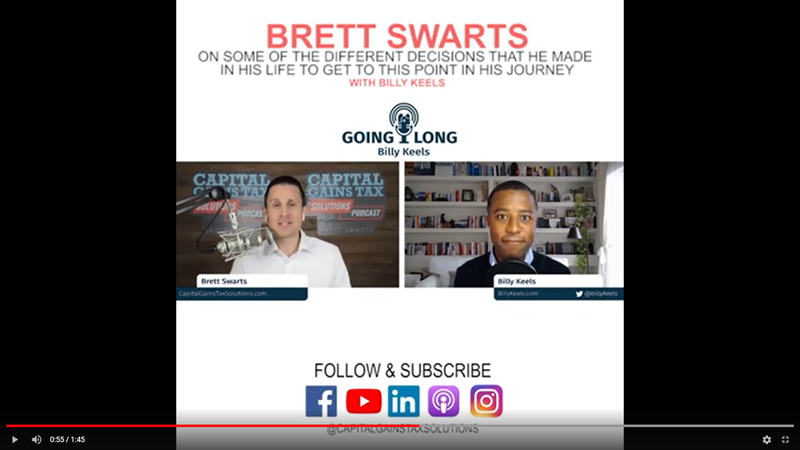
Brett Swarts:
What are some of the different decisions that you made in your life to get you to this point in your journey?
Billy Keels:
Yeah, great question. So, you know, growing up, love playing sports, love working on teams, love competition, love learning, and it was always kind of curious about subjects that I liked, I dove into stuff I didn't like I wasn't that excited about. So, I think it helped me in my journey to get mentors and get a good partner with or work for, or with those who are ahead of me. That helped me to grow and to learn. I've always kind of been the tortoise versus the hare Billy, right? It takes me a little while to get it. But once I get it, I tend to, you know, take it maybe to the next level and try to, you know, really make an impact for others using different strategies we're going to talk about, or even in sports, you know, I was a six-foot white guy who could shoot and play basketball, right, I was able to get a scholarship and play and maximizing my potential is kind of been. I was the younger brother of my older brother, then also the youngest kind of one of the youngest of like nine cousins. So I always had folks ahead of me that I could learn from, take me a little while to get it but once I get it, I tend to really approve it and maximize the potential of whatever that thing is. That makes sense.
Learn more about Deferred Sales Trust
Visit: www.capitalgainstaxsolutions.com
 Post: Bryan Ellis On Biggest Frustration with Capital Gains Tax
Post: Bryan Ellis On Biggest Frustration with Capital Gains Tax
- Specialist
- SAINT AUGUSTINE
- Posts 261
- Votes 26
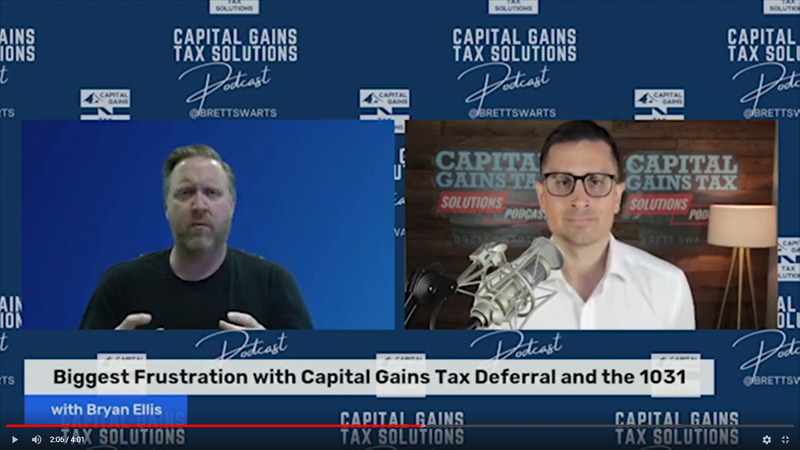
Brett Swarts:
Welcome to the Capital Gains Tax Solutions podcast, also streaming on the Expert CRE Secrets podcast. You can find us on YouTube, iTunes, and Google. My new friend here, Brian Ellis, and we just got done recording a video, a full podcast with his full story talking about all things raising capital in 30 days, you've got to check it out right now on YouTube. If you are looking for someone to help you clarify your sales copy, clarify your presentations, and help you to close more deals. That being said that we're talking about the biggest frustration when it comes to capital gains tax deferral on the 1031 exchange. Bryan, when it comes to that for yourself, partner, families, or is there a deal story, or something that comes to mind when it comes to frustrations around this topic?
Bryan Ellis:
It's really not my frustration so much as it is for many of the clients that I work with who want to invest in syndications and such the biggest frustration I hear routinely, particularly about 1031 is the complexity or the impossibility, it may be depending on how you see it of doing 1031 from a real estate property and then taking that money and investing it into another real estate project. But that's not a real estate project. That's a syndication because it's a different form of investment. So, a lot of people have that problem. I hear about that over and over and over again.
Brett Swarts:
We call that trying to squeeze the round peg into the square hole. Unfortunately, most syndicators that we work with as well either don't allow it, and or even when they're selling their syndication, they're just paying their tax and let everyone go their separate ways, because they're not even going to do a full 1031 exchange. So, becomes a big, big challenge. By the way, we have a solution for that. It's called the deferred sales trust for our listeners, we actually are connected with Ashcroft Capital. We're also connected, just got a new alliance with Kevin Bob, and a few others that practice capital as well, where we're now selling assets deferring the tax. And then what's neat because it's a trust, we're not using a 1031 exchange, you can actually invest into different syndications with yourself or with others, passively or actively. It's pretty, pretty amazing. That being said, You can learn more about that at capitalgainstaxsolutions.com. And again look for Brian Ellis’ full interview and also if you want to connect with him, Brian, what's the best place for people to find you?
Bryan Ellis:
The best thing to do is just text me at 678-888-4000.
Brett Swarts:
Perfect. Hey, thanks, Brian. And thanks everyone for listening to this quick episode. And look for the full episode right now on iTunes and YouTube coming soon. Thanks. Bye.
Learn more about Deferred Sales Trust
Visit: www.capitalgainstaxsolutions.com
 Post: HOW DEFERRED SALES TRUST WORKS, WHO THIS WORKS FOR, AND BENEFITS
Post: HOW DEFERRED SALES TRUST WORKS, WHO THIS WORKS FOR, AND BENEFITS
- Specialist
- SAINT AUGUSTINE
- Posts 261
- Votes 26
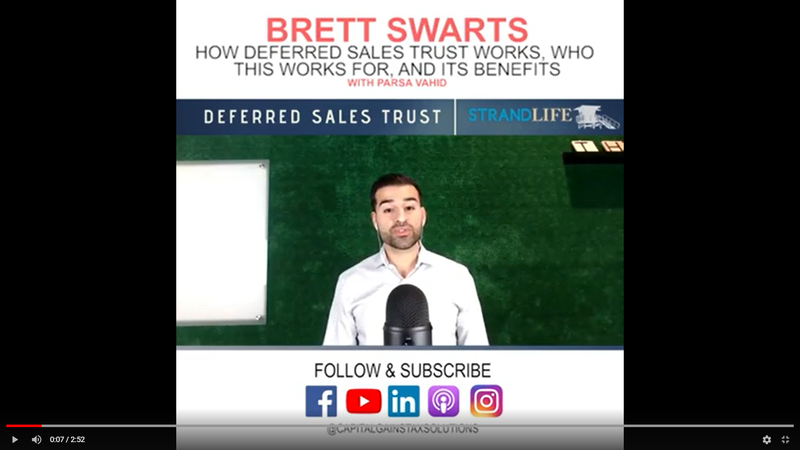
Parsa Vahid:
So Brett, just tell us a little bit, actually, go into as much detail as you think is appropriate about how this works, who this works for, some of the benefits, and just assume that a lot of the listeners may not know much about what a 1031 exchange is, would appreciate an asset is capital gains, just try to dumb it down as much as possible for us.
Brett Swarts:
Absolutely. So most commercial real estate owners, business owners, and high-end primary homeowners, you know, they struggle with capital gains tax somewhere between 30% and 50% of their gain when they go to sell their highly appreciated assets. And so we use a deferred sales trust to give them tax deferral, liquidity, diversification, and like you said in the intro, the ability to eliminate the need for the 1031 exchange, so they can create and preserve more wealth. That's really at the heart of what we're about is helping people escape feeling trapped and having some options for how they retire, or how much time and energy is spent towards those types of assets. So the main thing to look at is what we call the big, big shift that's happening right now, in the world. This is according to the American Bankers Association. There's about $17 trillion that's passing from one generation to the next in the next 20 years. This is known as the baby boomers. It's the largest wealth transfer in the history of the world. It's happening right now. In fact, there are about 77 million baby boomers in the US alone. And every day, about 10,000 of them are turning 65. So when you look at some of those numbers, what do they face as well, they're faced with highly appreciated assets that they've worked for 20, 30, 40 years to accumulate, and they're looking to retire from the toilets, the trash, the liability, and again, have some more liquidity, and perhaps just preserve their wealth versus the creation mode. Then you couple that with what happened in 2008, where a lot of people overpaid for properties before the crash, you know, ‘05 - ‘06 via the 1031 exchange, and we call this the perfect storm where instead of having to overpay for a property, you can maybe never buy a property again or buy properties whenever you want to. So it just gives you a lot more flexibility and a lot more options. We can customize a wealth plan based on the client's needs.
Learn more about Deferred Sales Trust
Visit: www.capitalgainstaxsolutions.com
 Post: Nitzan Mosery On Biggest Frustration with Capital Gains Tax
Post: Nitzan Mosery On Biggest Frustration with Capital Gains Tax
- Specialist
- SAINT AUGUSTINE
- Posts 261
- Votes 26

Brett Swarts:
Welcome to the capital gains tax solutions podcast, also streaming Expert CRE secrets podcast. I'm your host, Brett Swarts. We're here on a quick teaser interview focused on the biggest frustration with capital gains tax pro and the 1031 exchange. And I'm putting here my new friend, Nitzan Mosery and he is out of the great state of Florida. Originally, from New York, he tells his entire story in the full interview, which you can see right now on YouTube, and soon to be released on iTunes. But in this episode, we're focusing like a laser on the biggest frustration with capital gains tax deferral, and the 1031 exchange. So, Nitzan, what comes to mind, you mentioned maybe this deal in Dallas that she did was a phenomenal deal. You bought it at five and a half million you sell it at 11 million, 21 months later on the episode that we talked about. But then there was this big tax. So what happened? And what was the frustration and why?
Nitzan Mosery:
So, the frustration was that we wanted to do a 1031 exchange, but a couple of the investors decided not to. So, then we weren't able to go out and to take the entire entity and move it to another property and to roll back capital, and to save on the capital gains tax. That's pretty frustrating. And in today's market as well, with low inventory, and a lot of people coming into the market wanting to buy, you have such a short timeframe to do that 1031, when you close on a property, you only have 45 days to find your next project. And then you have 180 days to close on it. But to find a good asset to buy in such a tight market today. It's really frustrating and nail-biting.
Brett Swarts:
Yeah, because of the shotgun wedding, right? You get engaged in 45 days and married and 180. And now we have a solution for that. It's called the deferred sales trust. In fact, there's one gentleman who in 2006, he saw the writing on the wall, he's in Minnesota Nitzan, and he's worth about $250 million. He hates the stock market, he just prints money in commercial real estate. But for the first time, like The Big Short, that movie in that book, he was like, you know, there's something weird here, I don't want to do a 1031. I mean, they're going to just pay the tax, or I'll do this deferred sales trust thing because it gives me a shot to defer the tax. So he did it. And he kind of took a step of faith and just tried something new he has never done before. And so he's sitting there and he puts it into stocks, bonds, mutual funds, very secure, very conservative portfolio, nothing too risky, okay. And five years later, the bank calls them up and said, Hey, you know that property you just saw? He says, Yeah, well, we just foreclosed on. And we're just curious, do you want to buy it back? He said, Well, maybe what's the price? And they said 60 cents on the dollar. So he says, Yeah, that sounds like a pretty good deal. So he sold, he had the trust sell out of the stock positions, and he put it into an LLC, and he purchased that property, all tax-deferred, not using a 1031. And I heard that story, like most folks that well that's too good to be true. Like No, he's done and he's worth about a half a billion now and he keeps doing these deals. He just did another one for over 100 million. So these are advanced tax strategies that you know, hear capital gains tax issues we're trying to bring to everybody, commercial real estate brokers, syndicators operators, and so you can go to capitalgainstaxsolutions.com to learn more about that. And for listeners who want to get in touch with you Nitzan and find out how you're doing brokerage in South Florida, how you're buying and syndicating deals, and doing coaching what's the best place for them to connect with you?
Nitzan Mosery:
Sure, you can find me on my website www.investwithcip.com or via email. It's my first name, [email protected].
Brett Swarts:
Perfect! Thanks so much, Nitzan and everyone looked for the full interview. Live right now on YouTube. Bye now.
Learn more about Deferred Sales Trust
Visit: www.capitalgainstaxsolutions.com
 Post: PRIMER ON A 1031 EXCHANGE with Charles Dobens
Post: PRIMER ON A 1031 EXCHANGE with Charles Dobens
- Specialist
- SAINT AUGUSTINE
- Posts 261
- Votes 26
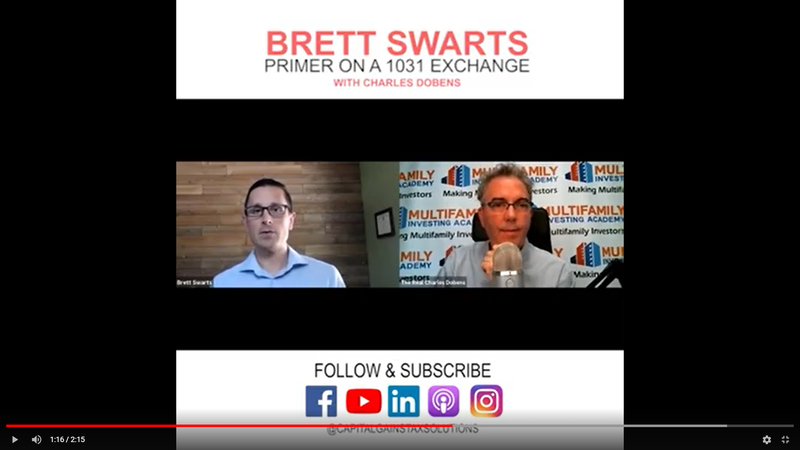
Charles Dobens:
Let's start with that element that probably everybody understands, a 1031 exchange. Go ahead and give me a primer on the 1031 exchange.
Brett Swarts:
Well, the IRS and the government, give us different legal loopholes to defer tax in order to spur the economy and keep money flowing. So 1031 is one of those tools, which allow someone to trade like-kind real estate into like-kind real estate of equal or greater value within a
Charles Dobens:
Like-kind of real estate or like-kind investments because real estate would be like-kind but an antique car collection may not be.
Brett Swarts:
Yeah. Charlie, your listeners may not know, but with the recent Trump Tax Plan, they made it even more specific. So it's basically at this point, commercial real estate investment, real estate for investment, real estate become even more narrow. As you know, they may take it away in future administration to make enough. They see it as a way to pay for some of the 22 trillion in debt that they have. But it's a legal way to defer capital gains taxes as long as you roll it into equal or greater value within a period of time. Typically, most of our clients, pick the three to three property rule, which means they identify within the 45 days, three properties, and they close on all one, two, or three of those within 180 days. Now, remember, we have to replace the debt, and we and basically the purchase price. So that's the other thing. You're staying in the debt and you're staying in the marketplace, but it's an excellent tool, especially if you're a commercial real estate owner who can find a value add forced appreciation opportunity.
Learn more about Deferred Sales Trust
Visit: www.capitalgainstaxsolutions.com
 Post: Barry Mathis On The Biggest Frustration of Capital Gains Tax
Post: Barry Mathis On The Biggest Frustration of Capital Gains Tax
- Specialist
- SAINT AUGUSTINE
- Posts 261
- Votes 26
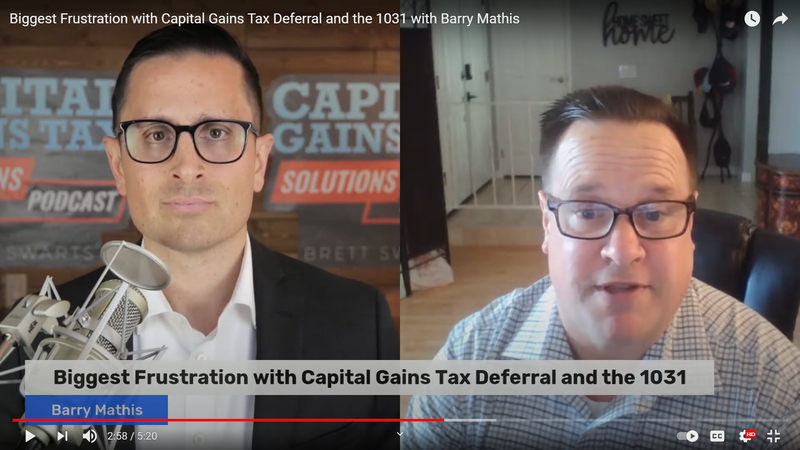
Brett Swarts:
Welcome to the capital gains tax solutions podcast. Also, stream on Expert CRE Secrets. I'm your host, Brett Swarts, my new friend here, Barry Mathis and we just got done viewing him in his full story, so much wisdom and so much information that you want to check it out right now on YouTube. It's also gonna be live on YouTube iTunes here shortly. But in this episode, we're just covering just the biggest frustration when it comes to capital gains tax deferral, the 1031. So Barry, what's the biggest frustration you, a client, or partner has faced when it comes to capital gains tax deferral and or the 1031 exchange?
Barry Mathis:
Well, I think stories are what matters. So I'm gonna jump into a story. I had a client that purchased a property he had saved all of his life, he's been in and out of different investments had done multiple 1031s. And he literally was at the, you know, the last leg, you know, he wasn't dead yet. But he was in his upper 70s, lower 80s you know, and so this was his get out of jail. He had sold a property in Oregon, where he was a property, part-owner of a park, a trailer park. And so he came down to Roseville, we bought an office building in Roseville. And so he was doing his 1031 exchange, he had been rolling it from time to time. And you know, this guy just did not want to pay taxes. That was just all there was to it. And we got into that 1031 and I've always been a little cocky, I'm a younger salesman at that point. And I thought why in the world would you ever need 180 days to close a property? Right? So why in the world? I mean, you got 45 days to identify, 180 days to close on it? Why would you ever need 180 days, I usually get things done in 30 days, or 45 days or maybe 60. Right. And so low and behold, we put up we identified that one property, we dropped our others were in that property and we're ready to go. And then in the middle of that transaction, we found out that the owner of the property, you might have heard this story, the owner of the property actually had embezzled a large amount of money from Sammy Hagar, who did a restaurant here in Sacramento with this gentleman, and the gentleman committed suicide. Well, Sammy Hagar, this is just my understanding. I did not personally talk to Sammy about this. But my the story I got was that Sammy Hagar had instructed his attorneys to slow down the sale of our property to slow down the sale of the office building, just to mess with the owner's family. And that's the story I got. I don't know if that's true or not. However, it appeared to be that was what was happening. And we took about 150 days, maybe 153 days, in order to get our transaction done because of those holdups. And hey, it scared me to death, scared my bad guy to death, he was going to lose a ton of money. So I would say the biggest challenge is inflexibility. You think you never need that much time. I thought I never needed that much time. But it almost cost my client a fortune. And so anything that will give you more options in that arena. Hey, I think that something you want to learn more about?
Brett Swarts:
Well, thanks so much, Barry. And yeah, we call it the shotgun wedding, right? You get engaged in 45 days, and you get married in 180 days. But sometimes, you know, the bridal parties aren't going to work out or things are going to change or time is going to change. And you never want to be caught with like Warren Buffett says, when the tide goes out, you see who's been skinny dipping, right? And the challenge becomes some of the stuff is out of your hands, right? You get caught in court, it can be alone, I did deal in Del Paso Heights for 15 units. And we literally closed on day one at I didn't sleep for a week. And part of it was we were assuming this loan for the client. He also was selling a mobile home park and reading and he was buying 15 units. And the challenge as it was one of these fixed loans with the government which typically means everything slows down. And so we had to assume the loan had huge yield maintenance on it. And I'm like with these guys month beforehand, hey, we got to close. We got to close we got to close. Anyways, we close on the day and I'm like, Oh my gosh, it worked out. But no one likes to work under that stress, right that fire drill. By the way, we have a backup plan now or an alternative called a deferred sales trust. In fact, we just say to Phil 1031 exchange out of Georgia was 128 units for a gentleman out of Northern California. And we saved his failed 1031 exchange without using one of his identification without doing a Delaware statutory trust using a deferred sales trust by the way go to capitalgaintaxsolutions.com to learn more about that. Barry, for those who want to learn more about you. where's the best place to find you?
Barry Mathis:
916-225-7777 shoot me a text I'll get back to you as soon as I can. And if you want to reach my website it's [email protected]. I apologize. That's my email. My website is brokerbarry.com.
Brett Swarts:
Perfect. Thanks. Thanks, Barry for being a part of the show. And thanks to everyone for listening. Take care. Bye
Learn more about Deferred Sales Trust
Visit: www.capitalgainstaxsolutions.com
 Post: What is a DEFERRED SALES TRUST with Jennifer Gilgoric
Post: What is a DEFERRED SALES TRUST with Jennifer Gilgoric
- Specialist
- SAINT AUGUSTINE
- Posts 261
- Votes 26
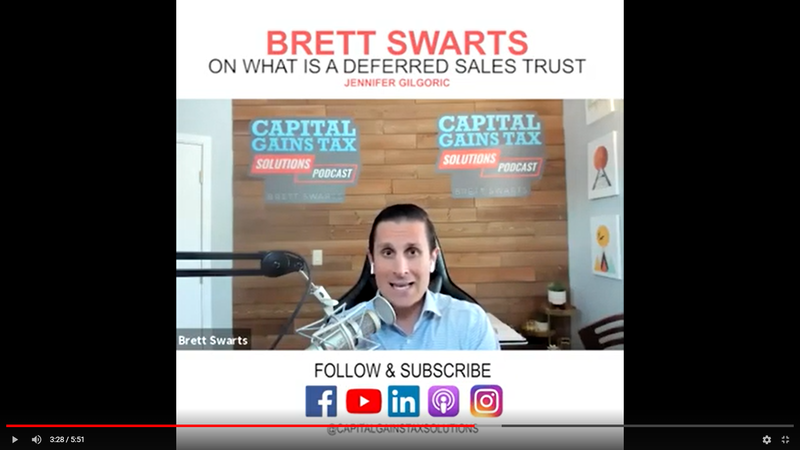
Jennifer Gilgoric:
Tell me a little bit about what you mean by avoiding that. So explain that a little bit. I'm very curious especially about our clients as well.
Brett Swarts:
Absolutely. So the first thing to understand there's a huge wealth transfer that's happening right now. It's somewhere between 17 and 20 trillion over the next 20 years. This is according to the American Bankers Association. In fact, it's the baby boomers, and it's the largest wealth transfer in the history of the planet that we know of, and what are they challenged with the challenge with toilets, trash liability, highly appreciated businesses, hiring high-end primary homes, and other appreciated assets. And they don't know how to get out and retire and sell and get liquidity without getting hammered by that capital gains tax. So the 1031 exchange is very limited, it only works for an investment property, but there are all these other assets that need the tax deferral, and that's what the deferred sales trust is really good. But essentially, there's this big amount of wealth, and how are these folks going to transfer and they have two options. Now, they can just hold and die, and hopefully, on the stepped-up basis, they could sell and pay huge taxes, most don't want to do, or a lot of them just going to stay in it and just feel burdened by all of this real estate, and all this management, all this liability, all of this debt. That's where most people stop because their CPAs don't know about the deferred sales trust. So that's where we enter this solution to provide all of those challenges. So we really call it the three secrets to an optimal timing wealth plan. By optimal timing to your initial premise of the show was essentially we're in Corona now and what's going to happen and when do people invest, and when are the deals coming if they're coming, and the key is to have freedom with your time, that means optimal timing, not to have to force to overpay for a property within a short 180 days, or 45 day identification period.
By the way, for your listeners, the Deferred Sales Trust is not the Delaware Statutory Trust, those are both DSTs. Delaware is simply another form of a 1031 exchange, which provides some we've done those two, and they have their place. But we do truly think that if you're looking for diversification, meaning you don't have to go into a single asset class, or single, you know, property with one single sponsor, and you're looking for liquidity, which is the second part, which is very beneficial over the Delaware, and you're looking for the opportunity to go into your own deal because a lot of all of our clients want to continue to invest, they just want to do it at a time that makes sense for them. This is where the deferred sales trust really stands on its own. So the number one secret to understand is you know how to sell and defer hundreds of 1000s if not millions of dollars in capital gains tax, basically how to legally break free from the capital gains tax, and to buy and sell your business or property without ever worrying about a 1031 ever again. So the deferred sales trust provides not only an alternative to a 1031 but also provides a backup plan for our failed 1031.
So I always love deal stories, and we just did a deal in Georgia, which was a $7.6 million multifamily property. This client of ours, his name is Dave. Dave has bought and sold hundreds of properties and done numerous 1031 exchanges for over 30 years. He's a commercial real estate expert. For the first time in his adult life, and his commercial real estate investing, he decided to use a Deferred Sales Trust. You see, he had sold, and he had about 3.1 million sitting with the exchange company, but he had to replace another four and a half million in debt and buy something of equal or greater value. He was looking around going these cap rates don't make sense. I know it's the high part of the market, these rents are pretty high. I don't want to buy it right now. He's sitting in the exchange, he's looking at deals not making sense. So he goes, I think it was gonna pay the tax, although he didn't pay the tax. Instead, he moved into the deferred sales trust, and he saved $1.1 million of tax. You can hear Dave’s story, I interviewed him on my podcast, and he tells his whole story. But what's really powerful about it, is he has now legally broken free from the 1031 exchange, which leads into the second part of this, which is how do you increasingly clone an optimal timing wealth plan. So, after thousands of closes over 24 years, we've basically figured out how to clone a deferred sales trust, optimal timing wealth plan, and give all of the freedom that it offers, but also all of the opportunity that it offers, which leads into the second story.
We call this the Monday morning quarterback and this gentleman, he's worth a couple of 100 million dollars, okay. He's a commercial real estate expert, which is my love and my passion for where I like to invest and earn wealth. And for him, he sold it in ‘06. He sold it like one of the peaks, you know, peak time. He waited on the sidelines, he moved all of his equity into the deferred sales trust, deferred all this tax. And he waited and guess what, five years later, that same property he sold was foreclosed on by the bank. And who did the bank call? Well, the bank called him they said, your property that used to own five years later, it's been foreclosed on. Would you like to buy it back? He said, “Sure”. But what's the cost? They said, How about 40% less than what you bought it for? And he said that sounds pretty good. So he bought it back for 60 cents on the dollar through his deferred sales trust. But here's the key, all tax-deferred, he did not use a 1031 exchange. And that's the part where your commercial real estate broker, your 1031 exchange company, they don't want you to know about this. Why? Because for the last five years, you haven't been buying and selling property. You haven't been sitting your funds in the exchange company where they make the return, that the Commission hasn't been earned on every single equal or greater value.
Jennifer Gilgoric:
Yeah. This is amazing.
Brett Swarts:
So that's exactly what we call the Monday morning quarterback. I'll pause there, because I know I said a whole lot and you guys probably have some questions.
Learn more about Deferred Sales Trust
Visit: www.capitalgainstaxsolutions.com




